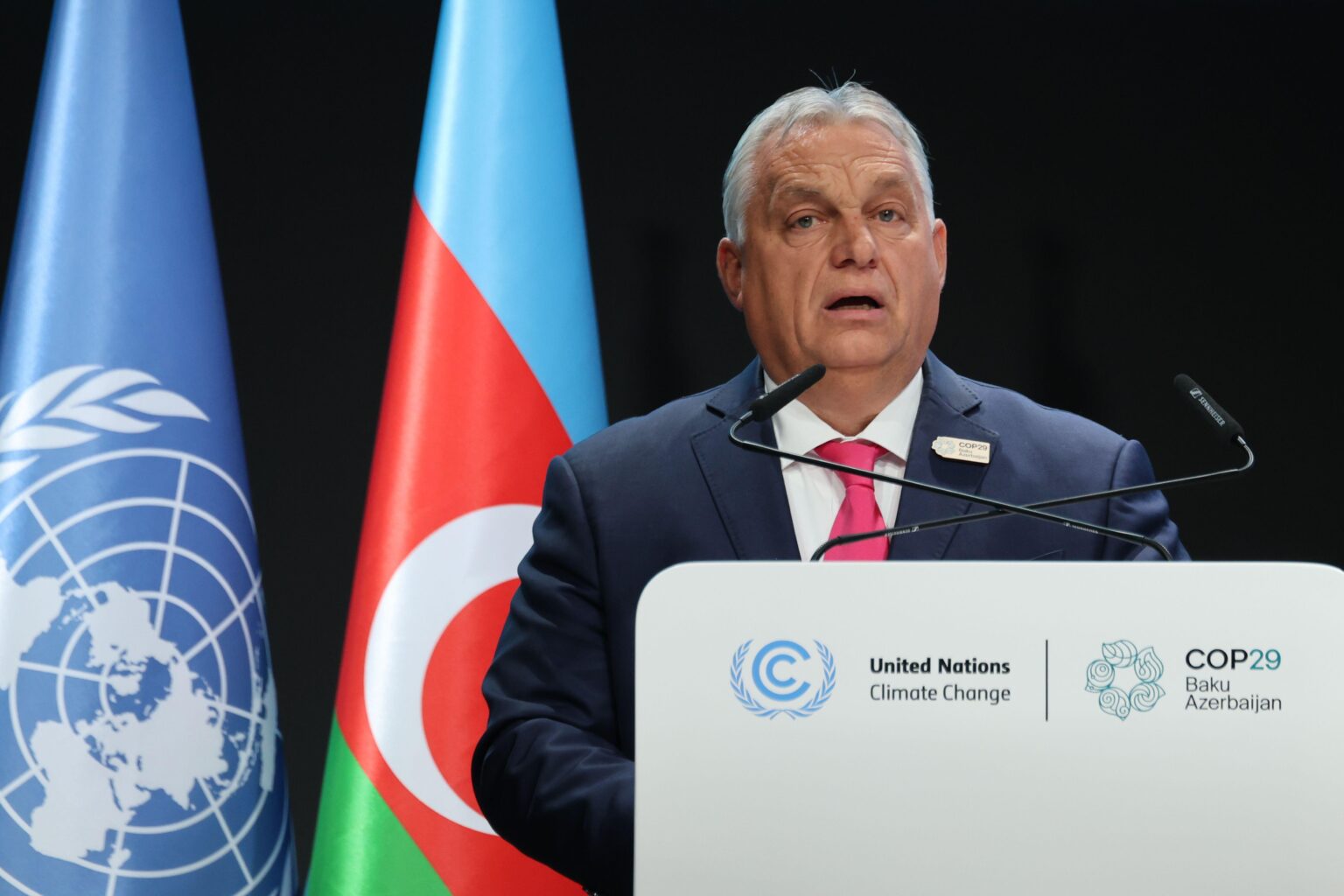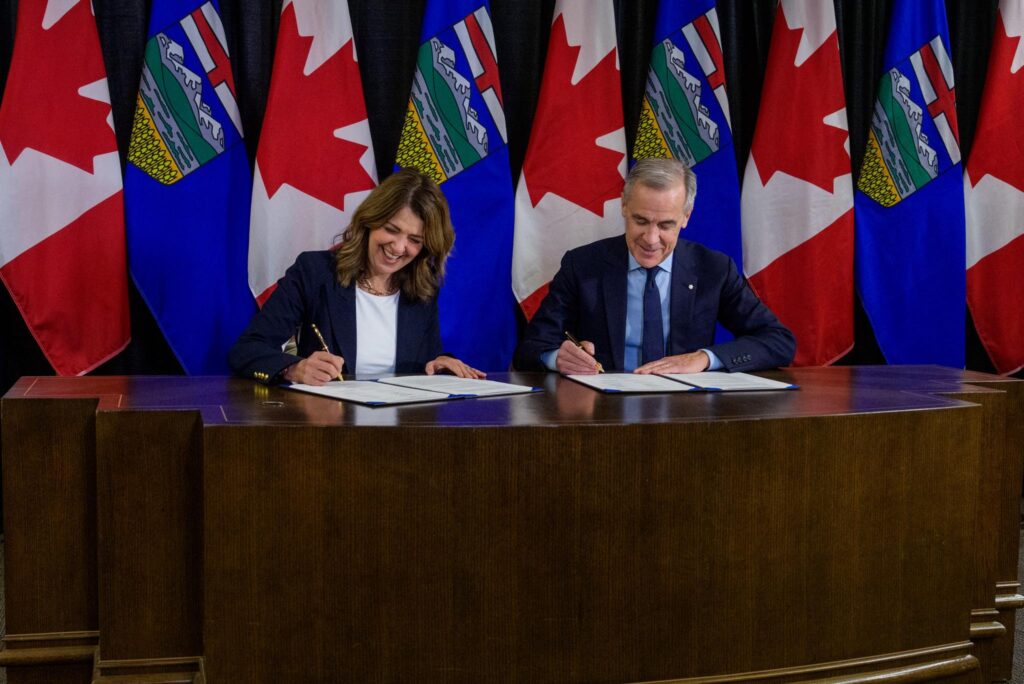A Hungarian “climate institute” attending COP29 is an offshoot of an Orbán-backed think tank funded by the state oil and gas company.
Nine delegates from the Climate Policy Institute (CPI) were down to attend the United Nations climate summit, now in its second week in Baku, Azerbaijan.
According to the official UN list, CPI director Mónika Besenyei, head of secretariat Csilla Gajer, three researchers and three “students” all attended as part of Hungary’s “overflow” delegation.
Subscribe to our newsletter
Stay up to date with DeSmog news and alerts
A spokesperson told DeSmog the institute was one of “many other NGOs” at the summit, and that they had “hosted events in collaboration with the UN, making us contracted partners of the global organization”.
Despite this significant delegation at the summit, and its stated mission “to promote nature-loving, nature-friendly practices”, DeSmog can reveal the CPI has ties to the Hungarian fossil fuel industry, and has promoted some of the world’s best-known opponents of climate action.
Its senior representatives have also attacked climate targets as “ideological” and likened climate advocates to a religious sect.
The CPI was set up in 2020 by Mathias Corvinus Collegium (MCC), a conservative think tank which received £1.3 billion from the Hungarian state that year. MCC was also given a ten percent stake in the country’s multinational oil and gas company MOL.
MCC has been criticised as a tool of Hungarian prime minister Viktor Orbán’s efforts to promote his government’s ideas and interests around the world. Its chair, Orbán’s political director Balázs Orbán (no relation), has said: “It is our goal for Hungary to become an intellectual powerhouse, in which MCC plays a key role.”
Hungary’s list of delegates at COP29 also include Viktor Sverla, vice president of MOL, and Attila Somfai, managing director of MOL Azerbaijan. Prime minister Orbán, one of only a few European Union leaders attending the flagship climate talks, used his platform last week to argue for the continued use of oil and gas.
The world’s leading climate scientists have said that no new oil and gas projects should be approved if emissions are to be cut enough to avoid the most devastating effects of climate change.
At least 1,700 fossil fuel lobbyists were granted access to COP29 this year, more than the 10 most climate-vulnerable nations combined. Last week DeSmog revealed that oil and gas companies including Chevron, ExxonMobil, SOCAR, and TotalEnergies had spent tens of thousands of dollars to sponsor events at the summit via a business lobby group.
Climate Policy Institute
The CPI describes itself as a think tank which “focus[es] on action and solutions, rather than scaremongering and climate change anxiety”.
Its website adds: “We also look at global issues through Hungarian eyes. In environmental protection, local values are as important as international climate agreements, quotas and summits.”
While it claims to support tackling climate change, the CPI has boosted the work of prominent opponents of climate action.
In March 2022, the CPI held an event in Budapest with Danish writer Bjorn Lomborg, to promote his 2020 book “False Alarm: How Climate Change Panic Costs Us Trillions, Hurts the Poor, and Fails to Fix the Planet”.
Lomborg has regularly downplayed the impact of climate change. In an article for the Wall Street Journal last year titled “Climate change hasn’t set the world on fire”, Lomborg cited a decline in the scope of wildfires worldwide since 2001 – despite rising temperatures making wildfires more likely and more destructive, according to experts.
In November 2021, the CPI held a launch event for the Hungarian edition of Michael Shellenberger’s book ‘Apocalypse Never: Why Environmental Alarmism Hurts Us All ’, which MCC helped publish.
In a 2020 cover piece for Forbes, which was later retracted by the magazine, Shellenberger apologised “on behalf of environmentalists everywhere” for what he called “the climate scare”, and claimed that “climate change is not making natural disasters worse”.
Gergely Kitta, head of institutes at MCC and head of communications at Climate Policy Institute, said: “The Climate Policy Institute firmly believes that tackling climate change is one of humanity’s most critical challenges. However, we remain critical of certain mainstream policies currently being promoted.
“We found Bjorn Lomborg’s perspective thought-provoking, particularly his argument that investing in poverty alleviation is essential to fostering greater public awareness of climate change.
“Similarly, Michael Shellenberger’s emphasis on the pivotal role of nuclear energy in achieving net-zero goals, as acknowledged by the IPCC [Inter-governmental Panel on Climate Change], IEA [International Energy Agency], and OECD, was of significant interest to us.”
Net Zero ‘Ideological Purity’
The CPI has also attacked the UK’s climate policies. The group’s director, Callum Nicholson, is also director of the Danube Institute, another Hungarian think tank which has received government funding via the non-profit Batthyány Lajos Foundation (BLA).
Danube Institute president John O’Sullivan – who was a speechwriter for Margaret Thatcher – wrote in 2021 that climate change is not happening as quickly as scientists say, citing the work of the Global Warming Policy Foundation (GWPF), the UK’s main climate denial group.
In June, Nicholson argued that the UK’s target to cut emissions to net zero by 2050 was “putting an ideological agenda ahead of realities”, and that the Labour government’s ban on new North Sea oil and gas licences was part of an “aspiration to purity” in a climate movement which he likened to “millenarian” religious sects.
The UK’s legally-binding 2050 net zero target is based on climate scientists’ recommendations for limiting global temperatures to 1.5C, as set out in the Paris Agreement.
Nicholson was speaking on a podcast called Deprogrammed run by the New Culture Forum, a conservative think tank based at 55 Tufton Street, a hub of anti-regulation lobby groups including the GWPF.
The CPI promoted the episode on its website, describing it as a discussion about “the politicization of science by managerial elites at the global and national level and why Labour leader Kier [sic] Starmer’s World Economic Forum agenda will ruin Britain.”
The idea that the World Economic Forum, a talking shop with no power to make policy, is behind climate policies has become a common feature of conspiracy theories since the Covid-19 pandemic, according to experts at the Institute of Strategic Dialogue.
MCC and the Danube Institute are involved in National Conservatism, a right-wing initiative which has held conferences attended by lawmakers and activists.
The two groups sponsored the NatCon event held in Brussels in April, and attended by Orbán, former UK home secretary Suella Braverman and Reform UK leader Nigel Farage.
Subscribe to our newsletter
Stay up to date with DeSmog news and alerts






